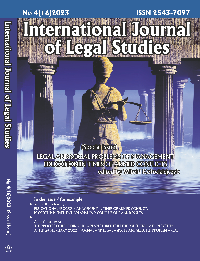BEZPIECZEŃSTWO I JAKOŚĆ KSZTAŁCENIA W SZKOLNICTWIE WYŻSZYM W WARUNKACH WOJNY W OCENIE UCZESTNIKÓW PROCESU KSZTAŁCENIA
SAFETY AND QUALITY OF HIGHER EDUCATION DURING WARTIME AS SEEN BY THE PARTICIPANTS IN THE EDUCATIONAL PROCESS
Author(s): Olha Zozulak, Nataliia BashurynSubject(s): Social Sciences, Education, Higher Education , Russian war against Ukraine
Published by: Międzynarodowy Instytut Innowacji "Nauka - Edukacja - Rozwój"
Keywords: safety of the educational process; higher education; martial law in Ukraine; distance learning; participants in the educational process; effectiveness and quality of providing higher education
Summary/Abstract: The paper addresses the theoretical and applied analysis of sociological study findings. The study involved the vice-chancellor's office, lecturers and students of Kherson State Univer-sity, and the vice-chancellor's office, lecturers and students of Vasyl Stefanyk Precarpathi-an National University. The study covered: the safety and quality of distance learning under martial law in Ukraine. The authors of the article draw attention to the practical aspects of the matters discussed, and also to the genuine feelings of the participants in the educational process, related to teaching and studying at a higher education institution during Russia's invasion of Ukraine. The authors also address the multi-level tasks that the participants had to face in the educational process. They also elaborate on the problem-solving strategies. The paper analyses the actions carried out by the authorities of the two universities under review (from the onset of the Russia's full-scale military invasion of Ukraine), as well as their relevance and effectiveness. It was concluded that the primary objectives in these conditions were to ensure the safety of all participants in the educational process; to main-tain the quota of the personnel and students; to facilitate distance working and learning for both students and lecturers. The paper focuses on the occupied Kherson and Kherson Oblast. The results of the surveys previously carried out among the vice-chancellor's of-fice's representatives of the two universities were also analysed, as were the survey respons-es regarding the safety and implementation of all possible methods and platforms for dis-tance or hybrid (stationary and distance) learning. The authors draw attention to the practical issues and the extent to which it is now possi-ble to guarantee a genuinely safe and effective educational process during wartime. The opinions of academics employed at Kherson State University and Vasyl Stefanyk Precarpa-thian National University were taken into account. By analysing the surveys completed by lecturers among whom previous research had been conducted, the main emphasis was placed on the questions relating to: the conduct of lecturers during the classes when an air raid alert is declared; the feasibility of teleworking; the effective use of resources and tools provided by the university; the overall evaluation of the level of knowledge and communi-cation with students; the quality of the provision of higher education under the conditions of martial law in Ukraine. The authors indicate that, as far as the surveyed university students are concerned,- there is a need for continuous transparency in communication based on mutual trust between the students, lecturers and university management. The effort should encompass the vast array of factors that are currently making the education process more complicated. It was also found that a number of students feel the need and necessity for: the large-scale develop-ment of distant learning; the provision of multimedia to make the studies interesting and worthwhile; the improvement of educational delivery methods; a uniform approach to guaranteeing the safety of all participants in the educational process, particularly during missile attacks and air raid alerts; a reduction in the demands placed on students in terms of the teaching load, as well as the testing and assessment of their knowledge.
Journal: International Journal of Legal Studies (IJOLS)
- Issue Year: 16/2023
- Issue No: 4
- Page Range: 81-120
- Page Count: 40
- Language: English

